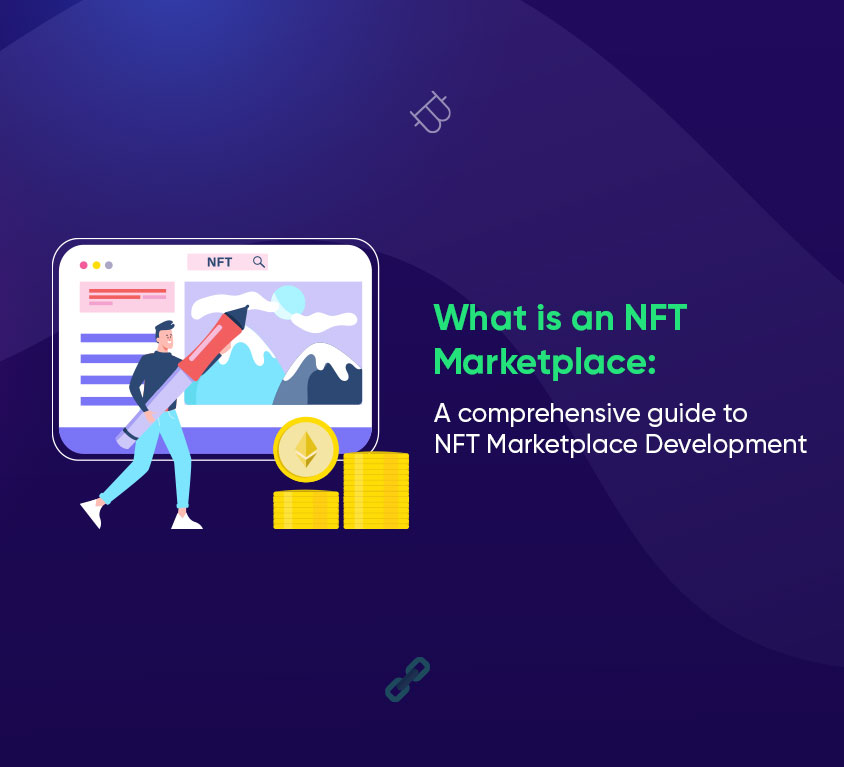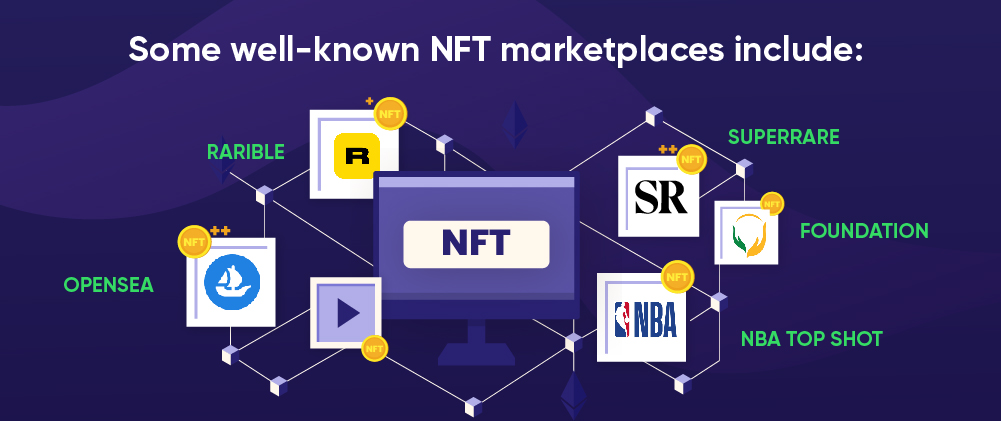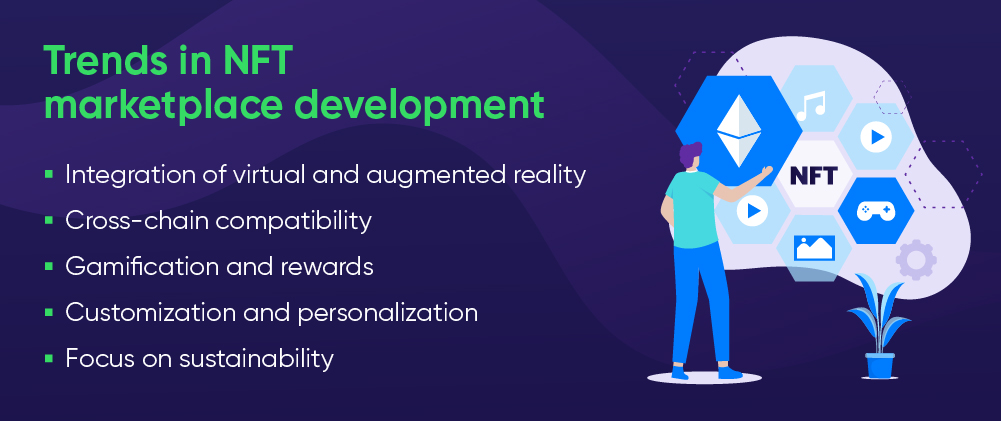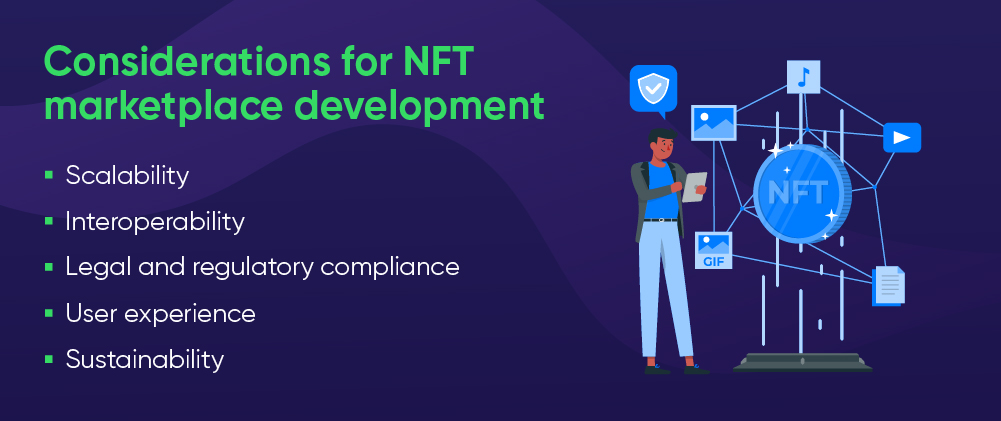
Introduction
Web3 & Blockchain Consultancy :
What is an NFT Marketplace: A comprehensive guide to NFT Marketplace Development
NFT, or non-fungible token, is a digital asset representing ownership of unique items or investments, such as art, music, and collectibles. Unlike cryptocurrencies such as Bitcoin, NFTs are not interchangeable, and each one has a unique value. NFTs represent digital art, collectibles, virtual real estate, music, and videos stored on a blockchain, a decentralized digital ledger, ensuring the digital asset’s authenticity, provenance, and ownership. In the next section, we’ll dive deeper into why building an NFT marketplace could be a lucrative opportunity for entrepreneurs and businesses. But first, let’s take a quick overview of the NFT Marketplace:What is an NFT Marketplace?
NFT marketplaces are decentralized platforms where users can buy, sell, and trade these unique digital assets using blockchain. Blockchain is a technology that ensures the ownership and authenticity of these digital assets, making them valuable and unique assets in the digital world.Significance of NFT Marketplace
NFT marketplaces have become increasingly important in the crypto industry. This is because NFT Marketplaces provide a new avenue for creators to monetize their digital assets and for investors to purchase unique and rare items. In addition, the market for NFTs has exploded in recent years, with sales reaching millions of dollars for some unique artworks.How do NFT marketplaces work?
NFT marketplaces are online platforms that facilitate the buying, selling, and trading of NFTs. These marketplaces connect creators, collectors, and investors who wish to transact with NFTs. Here’s an overview of how they work:- A creator uploads their digital asset to the marketplace by minting an NFT, which involves turning the digital item into a blockchain-based token with unique properties.
- The creator has to set a price, choose a payment method (usually in cryptocurrency), and provide additional details about the NFT.
- Buyers can browse the marketplace, search for specific NFTs, and view details about each NFT, such as its creator, provenance, and pricing.
- Buyers who are interested in an NFT can purchase it using the specified payment method.
- Finally, the NFT is transferred to the buyer’s digital wallet, and the transaction is recorded on the blockchain, ensuring the ownership change.

Reasons to Build an NFT Marketplace
-
Growing demand:
The NFT market has grown rapidly, with increasing interest from creators, collectors, and investors in digital assets and unique content.
-
Monetization potential:
NFT marketplaces can generate revenue through listing fees, transaction fees, and other premium services or features.
-
Supporting creators:
Building an NFT marketplace can provide a platform for artists and creators to monetize their work and reach a wider audience, enabling them to benefit from the growing interest in digital art and collectibles.
-
Niche opportunities:
As the NFT market matures, there is potential for niche marketplaces that cater to specific types of digital assets, industries, or communities, which can help differentiate your platform from existing marketplaces.
-
Technological innovation:
Developing an NFT marketplace allows you to explore and contribute to the emerging blockchain and decentralized technology landscape. Furthermore, it fosters innovation in the blockchain technology space and its applications.
-
Other benefits:
Building an NFT marketplace offers numerous benefits by providing a platform for artists and creators to monetize their work; NFT marketplaces enable them to capitalize on the growing interest in digital art, collectibles, and unique digital assets.
Lastly, by offering a well-designed, user-friendly platform, you can establish your NFT marketplace as a trusted and authoritative source for digital assets and related transactions.Business Opportunities for Revenue Generation:
-
Transaction fees:
NFT marketplaces can charge expenses on each purchase, sale, or trade conducted on the platform.
-
Listing fees:
Charging creators a fee to mint and list their NFTs on the platform can generate additional revenue.
-
Premium features:
Offering premium features or services, such as advanced search filters, promoted listings, or expert curation, can provide an additional income stream.
-
Advertising:
Displaying advertisements on the platform can also generate revenue.
-
Partnerships and collaborations:
Collaborating with brands, artists, or other organizations can create opportunities for sponsored content, exclusive NFT drops, or other promotional events.

How to Create an NFT Marketplace
Start by choosing your target niche and identify the types of NFTs or user groups you want to cater to, such as digital art, virtual real estate, or collectibles. Then you have to select a blockchain platform. Choosing a suitable blockchain network to build your marketplace on is vital, such as Ethereum, Binance Smart Chain, or Flow. You can contact a blockchain consultant if you need to gain prior knowledge. Then, create a smart contract that governs the minting, trading, and management of NFTs on your platform and prioritize usability and aesthetics when designing the front-end interface for your marketplace. Also, implement security measures to ensure the safety of user data and transactions by incorporating robust security features, such as 2FA and secure wallet integration. By integrating SEO and content strategy, you can drive organic traffic, improve visibility, and optimize your marketplace’s content and website structure using relevant keywords, meta tags, and high-quality backlinks. Now, launch and promote your marketplace. Once your NFT marketplace is ready, promote it through targeted marketing campaigns, social media, and collaborations with influencers or artists in your niche.
Best Practices for NFT Marketplace Design
- Ensure your marketplace is compatible with various devices, including desktop, mobile, and tablet.
- Make it easy for users to browse, search, and discover NFTs with a well-organized menu and search functionality.
- Use high-resolution images and visually appealing graphics to showcase NFTs and enhance user experience.
- Offer personalized recommendations and customizable interfaces to cater to individual user preferences.
- Ensure your marketplace is accessible to users with disabilities by following web accessibility guidelines and best practices.
When selecting an NFT marketplace development company, consider the following factors:
- Portfolio and experience: Review the company’s previous work and case studies to assess its expertise in developing NFT marketplaces.
- Technical skills: Ensure the development team has experience with your chosen blockchain platform and is proficient in relevant programming languages and tools.
- Design capabilities: Evaluate the company’s design skills, focusing on user experience, aesthetics, and responsiveness.
- SEO and content strategy expertise: Confirm that the company can optimize your NFT marketplace for search engines, incorporating relevant keywords and content strategies.
- Support and maintenance: Choose a development partner that offers 24/7 support and maintenance services to ensure your NFT marketplace remains up-to-date and functional.
Conclusion:
It is evident from the above discussion and guides that building a booming NFT marketplace requires careful planning, a strong development team, and a deep understanding of the market. And it is possible when you choose the right NFT marketplace development company. A reputable company will ensure that your platform offers a seamless, enjoyable user experience and is well-positioned to capitalize on the growing popularity of digital assets. Moreover, cross-chain compatibility, virtual and augmented reality integration, and a focus on sustainability will shape the future of NFT marketplaces. By staying abreast of emerging trends and prioritizing user experience, new platforms can thrive in the evolving digital asset landscape. Follow BloxBytes for more insights!
Follow BloxBytes for more insights!